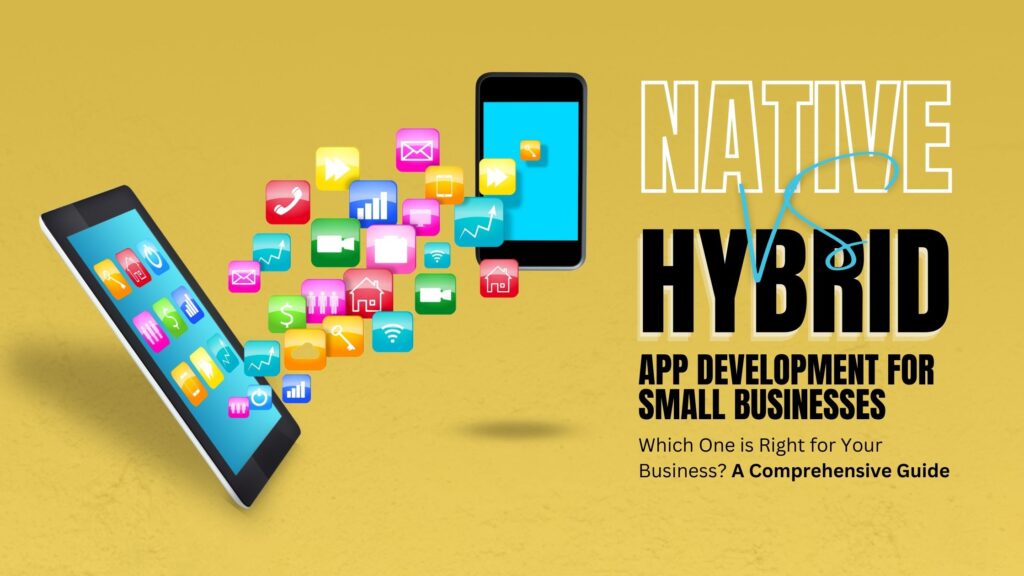The mobile app development world is constantly changing, and small businesses must make difficult decisions when it comes to developing their app. How should they choose between developing a native app for a single operating system and developing a hybrid app that can run on multiple platforms? This article will look at the trend of developing native vs hybrid apps for small businesses. Before making a decision, small business owners should weigh the benefits and drawbacks of each approach. By the end of this article, you should be able to make an informed decision for your own small business based on the benefits and drawbacks of hybrid and native app development.

Explanation of native and hybrid app development
Native app development involves creating an app that is built specifically for one operating system, such as iOS or Android. These apps are developed using the native programming languages of the target platform, such as Swift or Objective-C for iOS and Java or Kotlin for Android. Native apps are known for their high performance, smooth user experience, and ability to take full advantage of the device’s features and capabilities.
Say hello to the hybrid app world! These super-apps can run on multiple platforms, making them a crowd-pleaser. Built with web technologies like HTML, CSS, and JavaScript, these apps are then snugly wrapped in a native container, ensuring they can run seamlessly on different operating systems. Not to mention, their lower development costs, effortless maintenance and updates, and cross-platform compatibility make them a great choice for small businesses. The best part? Both native and hybrid app development come with their own set of pros and cons, so the ultimate decision is yours, based on your unique needs and goals.
Overview of the trend in app development for small businesses
The digital landscape is constantly evolving, and small businesses are keeping pace by embracing mobile app development. In an era where smartphones and mobile devices have become a ubiquitous part of daily life, having a strong mobile presence is now a critical aspect of success for small businesses. However, limited resources and budgets pose unique challenges in the app development process. Enter the trend of hybrid app development. As a cost-effective and efficient solution, hybrid apps allow small businesses to expand their reach and connect with customers across multiple platforms with a single codebase. The result? Reduced costs and effort required for both development and maintenance. And let’s not forget, hybrid apps are also easier to update and maintain, which is crucial for small businesses with limited resources. It’s important to keep in mind that the choice between native and hybrid app development depends on the specific needs and goals of the small business. While native apps offer high performance and advanced features, hybrid apps are known for their cost-effectiveness and cross-platform compatibility. The decision is yours to make, based on what will best serve your business


Advantages of Native App Development
- Improved Performance and User Experience: Native apps are designed to work seamlessly with the specific operating system they are built for, which results in a smoother and more responsive user experience. They are also able to take advantage of the device’s features and capabilities, such as the camera, GPS, and accelerometer, providing a more engaging and interactive experience for users.
- Better Access to Device Features: Native apps have access to the full range of device-specific features and functionalities, such as push notifications, in-app purchases, and offline access. This allows small businesses to create more advanced and feature-rich apps that can provide a better user experience and generate more revenue.
- Greater Flexibility in Design and Functionality: With native app development, small businesses have more freedom to design and develop apps that are tailored to their specific business needs. Additionally, native apps can be designed to take advantage of the latest design trends and device-specific features, providing a more visually appealing and engaging user experience.
- Better Security: Native apps are generally considered more secure than hybrid apps. They are more difficult to hack and can be better protected against security threats.
- Better App Store Visibility: Native apps are generally better optimized for app store visibility, which can help small businesses to increase their app downloads and increase their brand exposure.
In a nutshell, native app development may require more time and financial investment, but it brings a world of benefits to the table. Expect a smoother performance, enhanced user experience, and greater design and functional flexibility. Native apps also offer better access to device features, improved security, and heightened visibility in app stores, making them an ideal choice for small businesses looking to make a lasting impact in the competitive mobile market.
Advantages of Hybrid App Development
- Lower Development Costs: Hybrid app development allows small businesses to create an app that can run on multiple platforms with a single codebase, reducing the cost and effort required for development and maintenance. This can be especially beneficial for small businesses with limited resources and budgets.
- Easier Maintenance and Updates: Hybrid apps are easier to update and maintain than native apps. Since they use web technologies, updates can be made to the app’s codebase and pushed out to all users at once, rather than having to update each individual platform separately.
- Cross-Platform Compatibility: Hybrid apps can run on multiple platforms, such as iOS and Android, which allows small businesses to reach a wider audience and expand their customer base. This can be especially beneficial for small businesses that have a diverse customer base or are looking to expand into new markets.
- Reduced Time to Market: Hybrid apps can be developed and deployed much faster than native apps, which can be beneficial for small businesses that want to get their app to market as quickly as possible.
- Better Access to Plug-ins and Third-Party Tools: Hybrid app development allows small businesses to access a wide range of plug-ins and third-party tools that can be integrated into the app, providing additional features and functionalities without the need for additional development.
In essence, hybrid app development is the way to go for small businesses looking for a budget-friendly and streamlined solution. With lower development costs, easier maintenance and updates, cross-platform compatibility, and faster time to market, hybrid apps can help small businesses connect with a wider audience and drive revenue growth. And, to top it off, hybrid apps offer better access to plug-ins and third-party tools, providing small businesses with the tools they need to succeed.
Factors to Consider for Small Businesses
- Budget and Resources: The cost of app development is a major factor for small businesses, and it is important to consider whether a native or hybrid app will be more cost-effective for their specific needs. Additionally, small businesses should consider the ongoing maintenance and update costs for the app.
- Target Audience and Device Usage: Understanding the target audience and their device usage habits are crucial for small businesses when choosing between native and hybrid app development. For example, if the target audience primarily uses iOS devices, then a native iOS app may be a better choice, whereas if the target audience is more diverse in terms of device usage, then a hybrid app may be a better option.
- Business Goals and Objectives: Small businesses should consider their specific business goals and objectives when choosing between native and hybrid app development. For example, if the goal is to create a highly interactive and feature-rich app, then a native app may be a better choice, whereas if the goal is to reach a wider audience with a more cost-effective solution, then a hybrid app may be a better option.
- App Store Visibility: Small businesses should consider how their app will be visible on app stores. Native apps are generally better optimized for app store visibility, which can help small businesses increase their app downloads and increase their brand exposure.
- Security: Small businesses should consider the security of their app and whether a native or hybrid app will be more secure for their specific needs.
- Scalability: Small businesses should consider whether their app will need to be scaled in the future. Native apps can be more easily scaled as they are built for specific platforms, whereas hybrid apps can be more challenging to scale due to their cross-platform nature.
By considering these factors, small businesses can make a more informed decision when choosing between native and hybrid app development, and select the option that best meets their specific needs and goals.
Case Studies of Small Businesses
Example of a small business that chose native app development
A small retail business specializing in clothing and accessories decided to create a native app for their business. They chose to develop a separate app for both iOS and Android, as their target audience primarily used these two platforms. The business invested in a team of experienced native app developers to create an app that offered a highly interactive and visually appealing user experience. The app also had access to the device’s features and capabilities, such as the camera, GPS, and accelerometer, to provide users with a more engaging and interactive experience. The business was able to increase its brand exposure and generate more revenue from its app.


Example of a small business that chose hybrid app development
A small restaurant chain decided to create an app for its business. They chose to develop a hybrid app, as they wanted to reach a wider audience across multiple platforms with a single codebase. The restaurant invested in a team of experienced hybrid app developers to create an app that offered basic functionalities such as ordering online, making online reservations, and participating in loyalty programs. The app was able to run on both iOS and Android platforms and was easy to maintain and update. The restaurant was able to reach a wider audience and generate more revenue from its app.


Analysis of the results and lessons learned
Both businesses were able to achieve their goals and generate more revenue from their app, however, the retail business was able to provide a better user experience and access device features, whereas the restaurant was able to reach a wider audience with a cost-effective solution. It’s important for small businesses to consider their specific goals and resources when choosing between native and hybrid app development.
Example of a small business that chose native app development
A small fitness studio decided to create a native app for their business. They chose to develop a separate app for both iOS and Android, as their target audience primarily used these two platforms. The studio invested in a team of experienced native app developers to create an app that offered a highly interactive and visually appealing user experience. The app also had access to the device’s features and capabilities, such as the camera, GPS, and accelerometer, to provide users with a more engaging and interactive experience. The studio was able to increase its brand exposure, generate more revenue, and offer a better customer experience with the app.


Example of a small business that chose hybrid app development
A small e-commerce store decided to create an app for their business. They chose to develop a hybrid app, as they wanted to reach a wider audience across multiple platforms with a single codebase. The store invested in a team of experienced hybrid app developers to create an app that offered basic functionalities such as shopping carts, product descriptions, and customer reviews. The app was able to run on both iOS and Android platforms and was easy to maintain and update. The store was able to reach a wider audience and generate more revenue from its app.


Analysis of the results and lessons learned
Both businesses were able to achieve their goals and generate more revenue from their app, however, the fitness studio was able to provide a better user experience and access device features, whereas the e-commerce store was able to reach a wider audience with a cost-effective solution. These cases studies highlight that small businesses should consider their specific goals, target audience, and resources when choosing between native and hybrid app development to make the right decision for their business.


In conclusion, the trend in app development for small businesses has been shifting towards hybrid app development due to its cost-effectiveness and efficiency. However, the choice between native and hybrid app development should be based on the specific needs and goals of a small business. Native app development offers better performance and user experience, better access to device features, and greater flexibility in design and functionality, while hybrid app development offers lower development costs, easier maintenance and updates, and cross-platform compatibility. Small businesses should consider their budget and resources, target audience and device usage, business goals and objectives, app store visibility, and security, when making the decision. Additionally, small businesses should keep an eye out for new trends and technologies that could have an impact on their app development strategy.
The key points to consider when choosing between native and hybrid app development for small businesses are:
- Budget and resources
- Target audience and device usage
- Business goals and objectives
- App store visibility
- Security
- Scalability
If you’re a small business considering app development, it’s crucial to take a step back and assess your specific needs and goals, as well as consider the factors discussed earlier. Market research and a deep understanding of your target audience’s device usage habits should also be a priority. The future looks bright for app development with advancements in Artificial Intelligence, Machine Learning, and 5G technology set to revolutionize the game and open up new possibilities for small businesses to deliver engaging and interactive experiences to their users. In conclusion, the key to successful app development is to create an app that aligns with your business goals and meets the needs of your target audience. We hope this overview has provided valuable insights into native vs hybrid app development for small businesses.
Don’t miss out on the opportunity to take your small business to the next level with a top-notch mobile app. The right app can help you reach a wider audience, improve customer engagement, and drive revenue growth. So, what are you waiting for? Start your app development journey today and let’s work together to bring your vision to life. Contact us now to learn more about our app development services and how we can help you achieve your goals.

